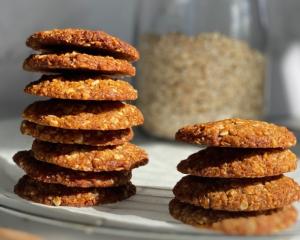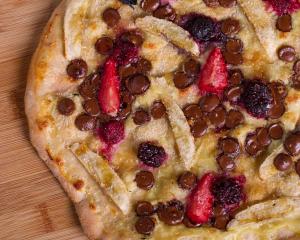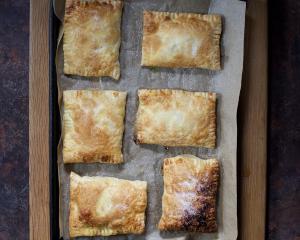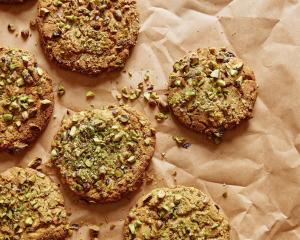We've all focused on Mediterranean food and forgotten cold-climate food, but that is ultimately where we are in Otago, according to Bevan Smith. He and his wife Monique own the award-winning Riverstone Kitchen north of Oamaru.
Known to Otago Daily Times readers for their monthly recipe column, "Chef's Garden," they have produced their first recipe book, Riverstone Kitchen: recipes from a chef's garden (HarperCollins).
They opened their restaurant nearly five years ago on Bevan's parents' farm just south of the Waitaki River, after returning from living in Brisbane.
When you drive into their car park you can't help noticing the extensive vegetable gardens and orchard surrounding it. The 300sq m gardens provide most of the vegetables for the busy restaurant, and the rest are sourced from nearby, such as Brussels sprouts and potatoes from Kakanui, or berries from near Waimate.
The meat also mostly comes from local farms: pork from Havoc and lamb from the Hawke family farm, both also near Waimate; salmon from the Mackenzie Country up the river; and beef from a farm on Banks Peninsula.
The Smiths are advocates of local, seasonal food. When you cook to a region's strengths with local produce, not only do you get the best and freshest produce but also the cheapest, Bevan says.
That's not to say he doesn't use subtropical northern fruits, such as tamarillos or feijoas.
"We'd come home from school and sit under a feijoa hedge with a teaspoon and that was pretty normal. There were tree tomatoes, kumquats and other cool things. Maori women used to sell smoked kahawai heads," he recalls.
In 1983, when he was about 10, his parents moved to the North Otago farm. Coming south meant a change of diet.
"Down here there's a different set of ingredients, culturally and food-wise, and it's great to look back and take the best of both worlds."
Food was cherished up north when his mother was a girl, an attitude Bevan has picked up.
"When we see local orchards where fruit is lying on the ground because it's not worth picking up, it seems like a crime and something twangs inside."
His mother, Dot Smith, who runs the gardens, presses him to use what is at its best, as it's easy to let things go to waste if you are not focused, he says.
Bevan trained as a chef in Christchurch, then went to the United Kingdom, where he worked at Le Pont de la Tour and The Canteen, two prestigious restaurants specialising in new wave British food, which centres on good local, seasonal produce and classic cooking techniques but with restraint and a modern twist. Then he worked at Philip Johnson's ecco bistro in Brisbane, which won best restaurant in Australia just before he joined.
"The food they were doing was exactly the kind of food I wanted to do. The focus was uncluttered, simple menus just focused on the ingredients and we tried to do - without sounding lazy - as little to the food as we could," he said.
At ecco he also learnt to be generous with flavours.
"Our blackcurrant ice cream blows people away because it's such an intense flavour. When you make ice cream yourself you don't stint on ingredients," he said.
"We find we constantly rediscover food and think about it in different ways. Last year we were doing shaved Brussels sprouts with almonds and I don't know how many people we converted back to Brussels sprouts with that. It's a local ingredient, possibly maligned in the past for many people because of maybe poor technique or lack of knowledge, and we just try to make it the best.
"Our favourite dish this year is probably shaved cabbage with some parmesan, balsamic and a few roast hazelnuts - how simple is that! But when you eat it, it's fantastic. It's fresh, it's crunchy, it's got that beautiful sweetness."
One of the best recipes in his new book is the mixed leaf salad, he says, something everybody should be able to make if they grow a few seeds in a pot or small plot. It's dressed with the simplest of dressings: good oil, a squeeze of lemon, a dollop of mustard, a pinch of sugar, and salt and pepper.
One of the secrets of his food is the freshness of the vegetables, not only from the garden that morning, but sometimes prepared at the last minute just before being put on the plate, like freshly shaved fennel or freshly chopped basil, which can quickly lose flavour once chopped.
"First and foremost we cook the food we like to eat and, when it tastes fantastic, that's what we like to put on the menu," he says.
The country restaurant, about 20 minutes drive north along State Highway 1 from Oamaru, attracts both locals and visitors, who seek it out since it won Cuisine Restaurant of the Year award last year and first-equal in the competition's best casual dining regional class this year.
'There's a new generation of professional young farmers who appreciate good coffee and good food and know their ales from their lagers," says Monique.
Until recently, when she took a step back to look after their two children, Noa (6) and Jordan (4), she ran the front of house.
Born in Zimbabwe, she moved to Brisbane, Australia, with her family when she was about 12, and met Bevan there. Trained as an opera singer, she took a waitressing job for the summer and loved it, to her parents' horror!"There is a crazy adrenalin rush. I like the organisation and multi-tasking and discipline and pace. I really like the perfection trying to make sure everything is as good as you can get it. And I've learned along the way that I also like the personal development it can give you when things don't go right. You learn a lot about yourself, and there's something comforting about being able to assist in some way," she said.
She is still shocked when someone who ordered fish and chips says that was the best meal they ever had.
"I think wow! You can open people's eyes to food and flavours and cooking and service."
Bevan explains they want everyone, whatever their culinary knowledge, to enjoy their food.
"Not everyone wants to sit down and eat scallops with cauliflower puree. At the end of the day it's our job to feed people and we want to do it without dumbing down our skills, so if we are going to make fish and chips we are going to make really good fish and chips - fresh fish done to order.
We have pies - at the moment they are venison pies, but they will be beef or lamb depending on season - and we make them ourselves.
"I'm a great believer that all people should be able to find food accessible. They shouldn't be alienated."
Hear him

Win it
The Otago Daily Times has five copies of Riverstone Kitchen to give away.
To enter the draw for one, write your name, address and daytime phone number on the back of an envelope and send it to Riverstone Kitchen, Editorial Features, Response Bag 500010, Dunedin, or email playtime@odt.co.nz with Riverstone Kitchen in the subject line, to arrive before October 11.












